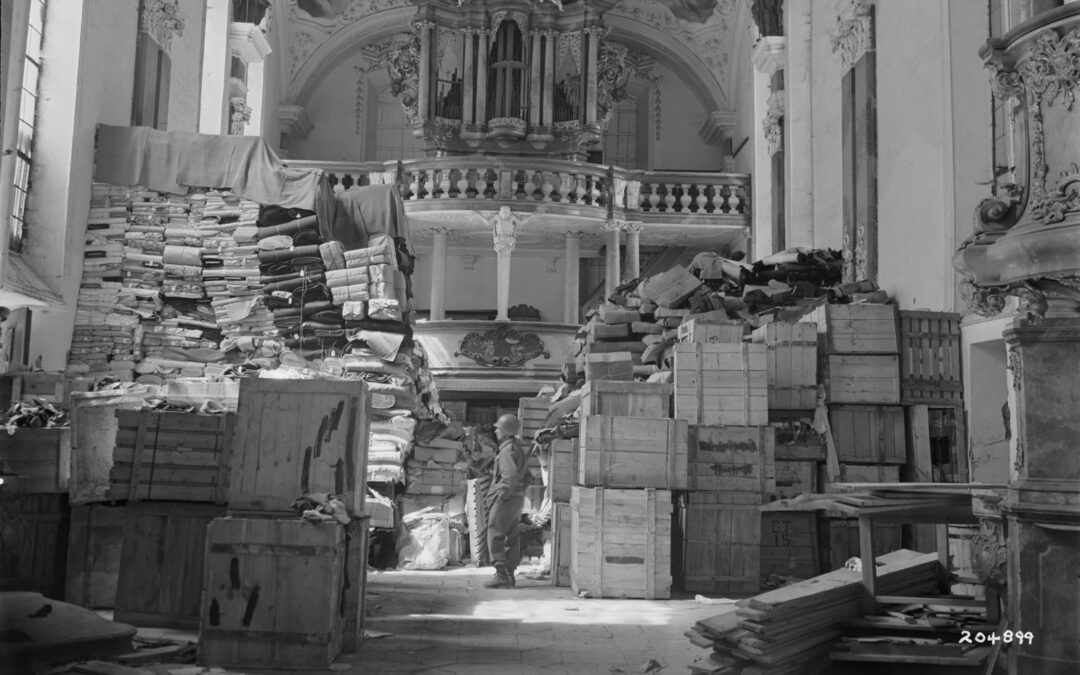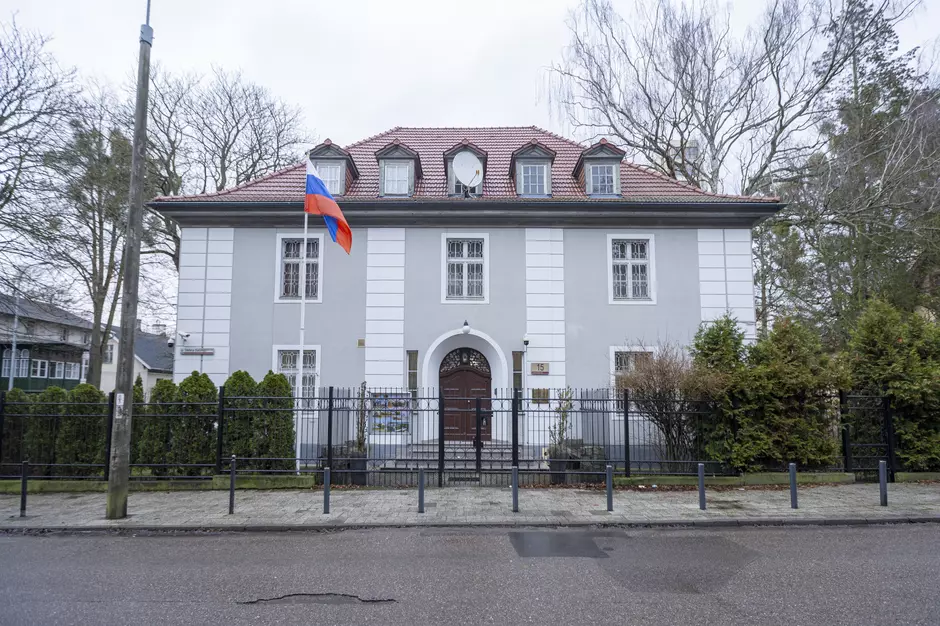Keep our news free from ads and paywalls by making a donation to support our work!

Notes from Poland is run by a small editorial team and is published by an independent, non-profit foundation that is funded through donations from our readers. We cannot do what we do without your support.
Poland’s culture ministry has confirmed that efforts are underway to secure the return of 73 historical documents – including a 15th-century peace treaty between Poland, Lithuania and the Teutonic Knights – that were looted by Germany in World War Two and are currently being held in a Berlin archive.
Last month, opposition MP Krzysztof Szczucki of the Law and Justice (PiS) party issued a parliamentary enquiry about the missing artefacts, one of which is an original copy of the 1422 Treaty of Melno.
“The peace document is one of the most important testimonies of the history of Poland in the Middle Ages,” wrote Szczucki.
"Niemieckie Ministerstwo Spraw Zagranicznych analizuje, czy zwrócić Polsce dokumenty, które zostały wywiezione w czasie okupacji i trafiły do Tajnego Archiwum Państwowego Fundacji Pruskiego Dziedzictwa Kulturowego"
Niemcy "analizują" czy zwrócić kradzione.https://t.co/ujjt6TaGQ4
— Wojtek44 (@Wojtek_44) October 9, 2024
He noted that, until 1941, it had been held in the Central Archives of Historical Records in Warsaw. However, in 1941, “the collection [that it was part of] was stolen by the Germans”, who were occupying Poland at the time.
“Despite evidence of the theft, 74 documents from this collection, constituting war losses, have not been returned…and 73 of them remain in the Secret State Archives of the Prussian Cultural Heritage Foundation [Geheimes Staatsarchiv Preußischer Kulturbesitz] in Berlin,” he added.
Szczucki noted that an inventory of the documents as well as scans of them, which “clearly show the prewar seals and signatures of the Central Archives of Historical Records in Warsaw”, are available online. The MP asked the culture ministry what action was being taken to secure their return.
In response, deputy culture minister Andrzej Wyrobiec wrote that “recovery of the priceless archival documents” had been taken up by the culture ministry in 2022, under the then PiS government.
In November that year, after carrying out an investigation into the circumstances surrounding the looting of the documents and previous attempts to recover them, the ministry issued a restitution request to the German archive.
The issue was then further repeatedly raised with Germany in correspondence and during meetings under both the former PiS government and the new coalition that replaced it in December 2023, including directly with German culture minister Claudia Roth in July this year.
The German government has approved the establishment in Berlin of an institution commemorating Polish victims of Nazi Germany.
It says that the enormous suffering of Poles under German occupation "is still not well known" among Germans today https://t.co/gThmPLNWCh
— Notes from Poland 🇵🇱 (@notesfrompoland) June 27, 2024
“Currently, the case of returning the archives to Poland is being processed by the German Federal Foreign Office, which is responsible for the restitution of cultural property stolen during World War Two by the German occupiers,” wrote Wyrobiec.
German foreign ministry sources with knowledge of the case confirmed to Notes from Poland that the Polish culture ministry has issued a claim for 73 medieval documents, including the Treaty of Melno, currently being held by the archive in Berlin.
They said that the “German government is ready to make progress” but that the issue is part of broader negotiations over the return of cultural goods in Poland and Germany that have been taking place since 1972 but “have been paused” for the last decade.
Poland has appealed to @UNESCO for help in securing the return of art and other cultural items looted by Germany during WWII.
"Today these things are in German homes, mansions, museums," says @arekmularczyk. "Germany has not yet been held accountable" https://t.co/cG5I1SLy68
— Notes from Poland 🇵🇱 (@notesfrompoland) December 17, 2022
The Treaty of Melno brought to an end the Golub War launched by the Teutonic Knights in 1422 against the Kingdom of Poland and Grand Duchy of Lithuania.
The agreement in particular resolved a territorial dispute between the Knights and Lithuania, thereby determining the Prussian-Lithuanian border. Part of that border still today remains the boundary between the Russian exclave of Kaliningrad (which was part of Prussia until World War Two) and Lithuania.
Poland made minor territorial gains under the treaty, including the town of Nieszawa. But it also agreed to renounce its territorial claims to other Prussian territories.
Fellow map painters! 🗺️ We have another offering to share with you ✨ A cool map depicting The State of the Teutonic Order, succeeding the Treaty of Lake Melno (1422).
Full res source image can be found here: https://t.co/f4QmzqsMdl pic.twitter.com/x5xGlwdrM7
— Europa Universalis (@E_Universalis) June 30, 2022
In his response to Szczucki, Wyrobiec noted that the treaty and other handwritten documents concerning Polish-Teutonic relations were initially kept at the Crown Archives in Kraków, Poland’s former capital. That archive then moved to Warsaw, the new capital, in 1765.
In October 1939, after the Germans had captured Warsaw, they entered the Central Archives of Historical Records and announced that some of its holdings would be moved to Germany. This was then carried out in 1941 against the protest of the Polish director of the archive, Antoni Rybarski.
According to Wyrobiec, Poland first attempted to obtain the return of the documents in 1948, three years after the end of the war. It then made a further effort in 1992, three years after the fall of communism.
An archive in Germany has returned personal items confiscated from Polish concentration camp prisoners to their families.
The objects, which included watches, jewellery, letters and photographs, were handed over at a ceremony in Warsaw https://t.co/a3e0nLDfP0
— Notes from Poland 🇵🇱 (@notesfrompoland) September 13, 2024
During the war, Poland saw vast amounts of its historical and cultural property looted by both the occupying Germans and Soviets. Poland estimates that hundreds of thousands of such items remain unaccounted for.
In 2022, the then Polish government appealed to UNESCO for help in securing the return of cultural items looted by Germany. Earlier that same year, it launched a campaign for the return of items located in Russia.
Separately, the PiS government also sought up to $1.3 trillion in reparations from Germany to compensate for the enormous destruction caused to Poland during the war. The new government that took office last year is no longer pursuing that claim but is in negotiations with Berlin over some form of “compensation”.
The German chancellor has announced that his country will offer support to surviving Polish victims of WW2 and will help strengthen Poland’s eastern border.
However, in both cases he did not provide details of what these measures will involve in practice https://t.co/gKX6142Alo
— Notes from Poland 🇵🇱 (@notesfrompoland) July 2, 2024

Notes from Poland is run by a small editorial team and published by an independent, non-profit foundation that is funded through donations from our readers. We cannot do what we do without your support.
Main image credit: NARA/Wikimedia Commons (under public domain)




















